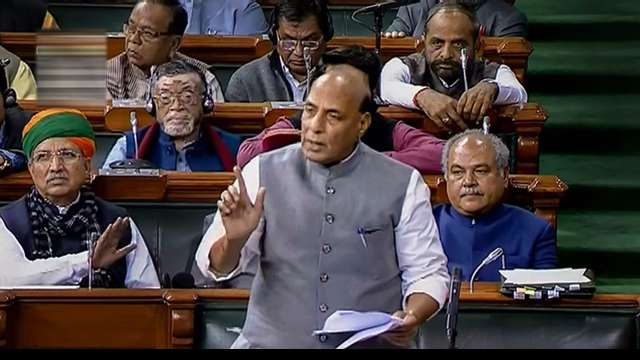Gujarat government to implement 10% quota for upper castes from January 14 - what you need to know
The Gujarat government said Sunday that it will implement the 10 per cent reservations in government jobs and higher education for the economically backward sections in the general category from January 14.
The Gujarat government said Sunday that it will implement the 10 per cent reservations in government jobs and higher education for the economically backward sections in the general category from January 14.
The Constitutional amendment to provide the 10 per cent quota received assent of President Ram Nath Kovind Saturday. The Gujarat Public Service Commission (GPSC) chairman Dinesh Dasa tweeted that all exams would be 'procastinated'.
"The economically weaker sections from the general category will get 10 per cent reservation in admissions to higher education and government jobs starting Uttarayan on January 14," the state government said in a release.
The new quota will also be implemented in admissions and jobs which were advertised before January 14 but for which the actual process has not started, it said.
In such cases, fresh announcement about the admission process or jobs will have to be made, it added.
However, if the recruitment or admission process -- tests or interviews -- has started before January 14, the 10 per cent quota would not apply, the release added.
Gujarat Congress chief Amit Chavda criticised the announcement, saying it will create confusion.
"The government has said it will implement the provision from January 14, which is Uttarayan holiday. The chief minister should explain the logic behind this announcement and the process to implement it," he said.
The BJP government should also explain the status of a stay granted by the Supreme Court on the similar 10 per cent reservation for EWS category in Gujarat that was introduced when Anandiben Patel was chief minister, Chavda added.
The "hurriedly made announcement" will create confusion among the candidates, he claimed
The bill to provide 10 per cent reservation to general category poor in jobs and education was Thursday challenged in the Supreme Court on the grounds it breached the 50 per cent ceiling on quotas, barely a day after the measure secured Parliamentary approval.
A petition filed by an NGO Youth For Equality organisation and its president Dr Kaushal Kant Mishra said in the present form the upper limit of quota goes upto 60 per cent which violated the decisions of the apex court.
A petition filed by an NGO Youth For Equality organisation and its president Dr Kaushal Kant Mishra said in the present form the upper limit of quota goes upto 60 per cent which violated the decisions of the apex court.
The organisation sought a stay and quashing of the Constitution (One Hundred and Twenty Fourth Amendment) Bill, 2019 as it was violative of the basic structure of the Constitution and that the economic criterion cannot be the sole basis for reservation. The Bill now goes to the President for approval.
It was contended that reservation on economic grounds cannot be limited to the general categories and that the 50 per cent ceiling limit cannot be breached.
Referring to the nine-judge bench decision of the apex court in the landmark 1992 Indira Sawhney case, the petition said the latest amendment completely violated the Constitutional norm that economic criterion cannot be the only basis of reservation.
"Such an amendment is hence vulnerable and ought to be struck down as it merely negates a binding judgement," it said.
It was contended that reservation on economic grounds cannot be limited to the general categories and that the 50 per cent ceiling limit cannot be breached.
Referring to the nine-judge bench decision of the apex court in the landmark 1992 Indira Sawhney case, the petition said the latest amendment completely violated the Constitutional norm that economic criterion cannot be the only basis of reservation.
"Such an amendment is hence vulnerable and ought to be struck down as it merely negates a binding judgement," it said.
Gujarat government to implement 10% quota for upper castes from January 14 - what you need to know
4. Eligibility
1) Annual income below Rs 8 lakh per annum
2) Agricultural land below 5 acres
3) Residential area below 1000 square feet
4) Residential plot below 109 yards in notified municipality
5) Residential plot below 209 yards in non-notified municipality area
5. More IITs, IIMS?

5/5

5/5
The modalities are yet to be worked out about how the quota will be implemented. All the universities and educational institutions recognised by the University Grants Commission whether government run or private will have to implement the quota," a source said.
"While the initial estimates reflect that around 10 lakh seats will have to be added in institutions across the country, including central universities IITs and IIMs, among other prestigious higher educational institutions," the source added.
As per the All-India Survey on Higher Education (AISHE), 2017-18, the country has a total of 903 universities, over 39,000 colleges and over 10,000 stand-alone institutions. The proposed reservation will be over and above the existing 50 per cent reservation enjoyed by the scheduled castes, scheduled tribes and the other backward classes, and will take the total reservation to 60 per cent. The bill is likely to introduce criteria like an annual income below Rs 8 lakh and not owning more than five acres of agricultural land for those seeking quota benefits
Gujarat government to implement 10% quota for upper castes from January 14
4/
5
Oleh
techgujgk


